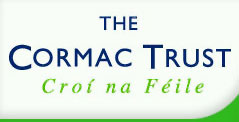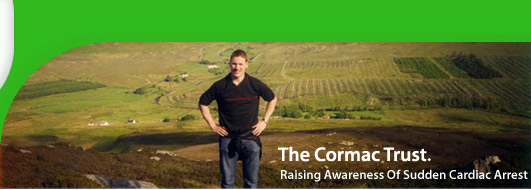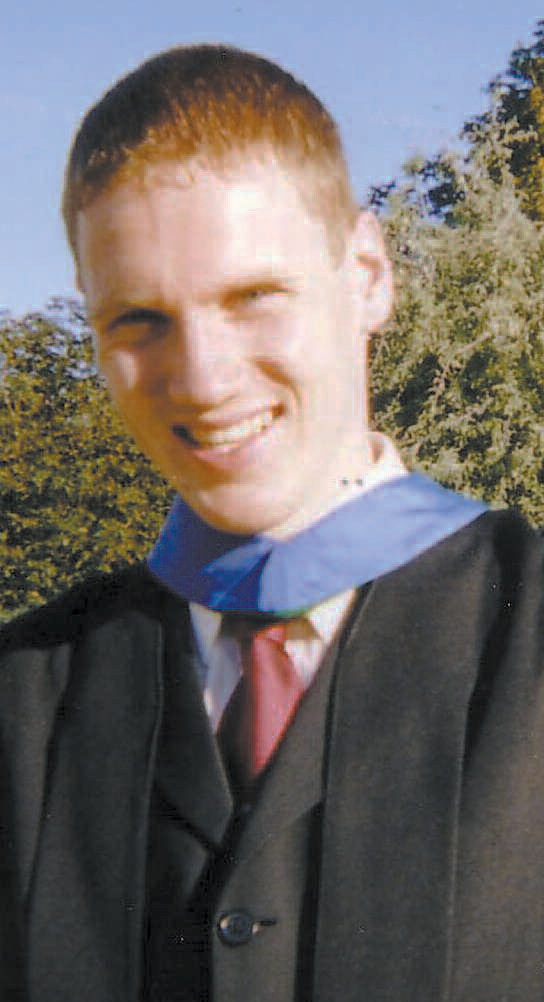KICK-START MY HEART
DAVID HENNESSY looks at Sudden Cardiac Death, the sudden killer that even healthy sports people are not safe from…
It has become a familiar story to every Irish person: The tragedy of a seemingly perfectly healthy
young person being killed by a heart condition that in many cases they were unaware of. Often occurring in the middle of or straight after physical activity, it has been called Sudden Adult Death Syndrome, but can also be referred to as Sudden Cardiac Death.
Twelve young people die in such circumstances every week in the UK and there are between eighty and a hundred cases every year in Ireland. However it is difficult to give exact numbers as some may appear to be cases of drowning or car accidents while asthma and epilepsy appear to be the causes of others.
The case of Cormac McAnallen was undoubtedly one of the more high profile cases that brought a widespread problem to the nation’s attention. A dedicated footballer, Cormac McAnallen had won provincial and All- Ireland titles with Tyrone.
Appearing the picture of health and fitness, the country was stunned when he died suddenly in his sleep on 2 March 2004. A terrible loss, heartfelt tributes came from his manager Mickey Harte, various other GAA figures and even President Mary McAleese.
“The problem is the healthiest of young people can die from something they never knew they had,” Cormac’s mother Bridget explains.
“Young people can die suddenly in road accidents and other accidents and you try to prevent them where possible. There are very few conditions that can kill as suddenly and this is one that has no preventative measure, you can’t say ‘do this and you’ll be alright’.
“People don’t get months, they don’t get weeks, they don’t get days, they don’t get hours, they only get minutes to be saved. You won’t be saved unless someone close has a defibrillator.”
Cormac’s death, along with that of John McCall who collapsed while playing for Ireland in the Under- 19 World Cup and those of other sports people brought the matter to the population’s attention, but also brought about one of the popular misconceptions about the topic.
“The message has actually got across too well in one respect,” Bridget reveals. “While we want people to realize they could have these conditions even if they look fine and feel fine, there is this myth that they just affect sportspeople. That is definitely not true. In fact the majority of these deaths happen to ordinary people that don’t play sport or are certainly not major sports people.”

Seaghan Kearney (centre, front) with (clockwise) Alan Brogan, Rob Kearney, Bernard Brogan and RTE’s Kathryn Thomas
The cause of Cormac’s death was revealed to be long QT syndrome which is a genetic heart condition where an irregular heartbeat may lead to palpitations, fainting and sudden death. With many different varieties, long QT syndrome is the most common cause of sudden cardiac death while hypertrophic cardiomyopathy is another big cause. “There may well be triggers but that’s not well known yet,”
Bridget discloses.
“A lot of people who have these conditions don’t know they have them and they may have no symptoms. They could just suddenly have an attack in the middle of the night, when they are having their lunch or when they are playing sport.
“Vigorous exercise may bring on an attack in some cases but not in them all and that is a mistake that a lot of people make. The only way you can do anything about long QT syndrome and similar conditions is to screen young people, especially if there is a family history of heart trouble.”
Like Cormac, many of the young people who suffer Sudden Cardiac Death display no prior symptoms but Bridget tells me the signs are not always picked up on.
“You might think it would be obvious to people if they had symptoms but very often the symptoms are dizziness, chest pains, fainting or something as simple as being abnormally out of breath. Very often symptoms can be overlooked, even by doctors who wouldn’t suspect a heart condition in an eighteen-year-old.”
With the support of her family and some members of the Tyrone County Board, Bridget set up the Cormac Trust to raise awareness of sudden cardiac death in young people and its causes, to promote cardiac screening for young people, especially athletes, to support those effected, to provide lifesaving defibrillators
for sports clubs and, most importantly, to fund research into the subject.
Just last year, Seaghan Kearney collapsed in the middle of a relaxed five a side soccer game. His heart dead, his friends and team mates had only minutes to locate the nearby defibrillator and shock his heart back into life. Seaghan thanks his friends’ quick thinking and alertness for the fact that he is still with us, but thanks something else, or someone else, ultimately for his life.
“It was the Cormac Trust that saved my life,” the 31 year old teacher tells me. Being one of the only five people to survive a sudden cardiac arrest during sport, his gratitude for being alive is audible in his voice and probably what compels him to also raise awareness of the issue.
“You realise how lucky you are. Unfortunately there haven’t been many survivors but the more awareness that is out there, the more lives may be saved,” he adds. Seaghan has been heavily involved with the Mater Hospital’s ACT campaign which has been endorsed by several high profile sports people including Rob Kearney, Tommy Bowe, Bernard and Alan Brogan and Seán Óg Ó hAilpín.
ACT is an appeal for sports clubs to have a defibrillator and follows these rules: Make sure it is Accessible, make sure it is Charged and make sure people are Trained how to use it.
“Having such names give their time really helps the cause,” Seaghan enthuses. “I’m just another Joe Soap but when you see Alan Brogan or Rob Kearney who are big names, people take more notice and pay more attention to the condition.”
Before his collapse, Seaghan had always been fit and healthy, playing sport to a high level without ever having any complaints of any kind. He remembers very little of the horrifying episode: “Because my heart stopped for approximately four minutes, my vital organs stopped receiving oxygen. I actually don’t remember anything from the day because the short term memory was wiped. From talking to people I know I was in good form and it was just a normal Monday.”
The Mater Hospital is not the only major screening clinic, with one also open at Tallaght Hospital. Rugby brothers Leon and Owen Cullen were present at the Tallaght launch to emphasise the importance of testing in the case of a family history. Both clinics are going very strong but don’t get funded by the government and must always raise their own funds.
“The Mater Foundation do some Trojan work,” Seaghan points out. “These conditions are hereditary, so if it does strike in the family, the likes of the Mater Foundation know what they’re looking. While general screening may miss something, if you know the particular condition that you’re looking for, you can find it.
“I’ve had family members screened and thankfully they all showed up okay but I know other families who may have lost a loved one and a similar condition has shown up so they can be warned ‘you have the same condition and you can take certain precautions’.
The likes of the Mater Foundation do really important work in this area and should be supported by the government.”
Both Bridget and Seaghan are keen to point out that, while screening can be hugely effective, is still fallible. This can be illustrated by the case of Ross McCann who was about to embark on a regime to get himself back into shape when he decided to get screened.
With nothing coming to light in his screening, Ross was told everything was fine only to collapse in he gym while working out. Much like Seaghan, it was quick thinking gym staff that brought him back to life with the defibrillator that was on hand. Is it an Irish problem, or do we only hear of the Irish cases?
“The problem is not confined to Ireland and Britain,” says Bridget. “It may well depend on the genetic make-up of a population which conditions are common. There are 3,000 deaths in America every year.”
“Screening has been taking place in Italy for many years. Deaths of prominent sports people has brought more but I do believe there is very little awareness in most countries in Europe.”
Indeed, it has affected soccer players like Marc Vivien Foe who died on the football pitch in 2003, shocking the sporting world.
More recently, Antonio Puerta, a rising Spanish star, died of cardiac arrest at the age of 22 while playing for Sevilla in 2007. Real Madrid’s Ruben de la Red also suffered a similar episode during a game and never returned to play. As a result of such tragedies, a defibrillator is a legal requirement at all professional Spanish matches, as well as any sports centre in the country.
There have been great strides in the right direction but Bridget thinks we can still do more: “I would like to see mass screening in schools as the onset of these conditions occurs around the beginning of adolescence. The screening is quick, painless and could be very cost effective.”
Seaghan would like to see government doing something about it. “I would like to see legislation introduced whereby defibrillators would become compulsory in all public buildings, similar to fire escapes and fire extinguishers.”
A young person dies from these conditions each week. Cork GAA player Kieran Hegarty collapsed after a training session in May this year which tells us, in spite of the good work already done, the message must go further still. From all accounts, Cormac McAnallen was a selfless individual and a teacher who would often go the extra mile. It seems a fitting legacy that a trust in his name now gives life back to people with the same condition, even if it is too late for him.
• For more information on sudden cardiac death, you can contact: The Mater Foundation,
53-54 Eccles St,Dublin 7. Tel: (01) 803 4354. Fax: (01) 803 4417. Email: contact@materfoundation.ie and The Cormac Trust, C/O 61 Main St., Benburb, Dungannon, Co. Tyrone. BT71 7LG. Email:
info@thecormactrust.com
David Hennessy – The Irish World – 19th November 2011



